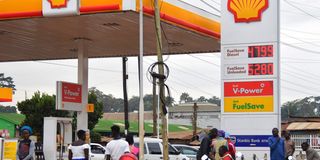Govt monitoring fuel prices

Motorists refuel at Shell Nakawa in Kampala last week. Most fuel stations have in the last fortnight or so raised their prices for fuel by more than Shs300. PHOTO/FILE
What you need to know:
- The Energy ministry has attributed the price increases to the demand and supply in the global oil market, whereby global demand for oil increased to 103 million barrels per day in June.
The Ministry of Energy and Mineral Development has said it is monitoring the global oil market and exploring strategies to enhance the supply of petroleum products in the country.
In a statement yesterday, the ministry noted that the pump prices in the country have risen, though it did not give specific amounts.
In the last two weeks, diesel and petrol prices have increased between Shs80 and Shs500 at various filling stations in Kampala, with a litre of petrol being sold at more than Shs5,100 and diesel at about Shs4,800.
The Energy ministry has attributed the price increases to the demand and supply in the global oil market, whereby global demand for oil increased to 103 million barrels per day in June.
This demand increased from the projected annual figure of 102.1 million barrels a day, according to the International Energy Agency (IEA), which provides data on the global oil market.
The IEA said the August figures are expected to be much higher, with experts projecting an increase of 2.2 million barrels per day in the last six months of 2023 before falling to 1 million barrels per day in 2024.
However, the ministry, just like IEA, expects the oil prices to increase further due to reduced oil production, with the Organisation of the Petroleum Exporting Countries (OPEC) and its counterpart OPEC+ cutting supplies by about 2.2 million barrels a day in this quarter and by 1.2 million barrels per day in the last quarter, “the seasonal impact of the summer season in Europe and the United States, foreign exchange fluctuations, and the notable increase in oil prices, guided by Platts assessments”.
The global oil supply was 101.8 million barrels per day in June, and is expected to reduce due to the supply cuts by the OPEC+ from September.
The ministry also noted that foreign exchange rate fluctuations and prices of brent crude oil have influenced fuel prices in Uganda.
In its statement, the ministry said the exchange rate against the US dollar was Shs3615 in July and increased to Shs3,725 in August, impacting fuel pricing.
The ministry said the price of brent crude oil per barrel surged from $74.35 (about Shs280,000) in July to $82.45 (about Shs301,000) in August.
Additionally, refined petroleum product prices, guided by Platts, which is a global provider of commodity and energy information and benchmark price assessments, have increased significantly.
“Diesel prices rose by $135 (about Shs499,400) per metric tonne, and petrol prices increased by $67 (Shs247,900) in August compared to July. These price increases are directly affecting the cost of fuel imported into Uganda, which in turn influences domestic fuel prices…While Uganda remains competitive in fuel pricing, it is essential to continue to monitor these factors closely,” the ministry said yesterday.
It added: “We continue to do vigorous monitoring of the global oil market and exploring strategies to enhance security of supply of petroleum products in Uganda since scarcity of fuel in the country can trigger a pricing crisis.”




